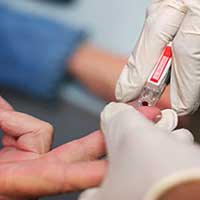VirScan – a single blood test can now simultaneously test for more than 1,000 different strains of viruses that currently or have previously infected a person.
Brigham and Women’s Hospital (BWH) and Harvard Medical School researchers tested for evidence of past viral infections, detecting on average 10 viral species per person.
The new work sheds light on the interplay between a person’s immunity and the human virome — the vast array of viruses that can infect humans – with implications both for the clinic and for the field of immunology.
“VirScan is a little like looking back in time: using this method, we can take a tiny drop of blood and determine what viruses a person has been infected with over the course of many years,” said corresponding author Stephen Elledge, PhD, a principal investigator in the Division of Genetics at BWH and Gregor Mendel Professor of Genetics and of Medicine at Harvard Medical School.
“What makes this so unique is the scale: right now, a physician needs to guess what virus might be at play and individually test for it. With VirScan, we can look for virtually all viruses, even rare ones, with a single test.”
Difference between VirScan and ELISA
Classic blood tests, known as ELISA assays, can only detect one pathogen at a time. Additionally, ELISA assays have not been developed against all viruses, further limiting their usefulness.
The team found the sensitivity and specificity of VirScan to be very similar to that of ELISA assays. The tests cost a comparable amount to run.
VirScan – a prognostic tool
VirScan may also help researchers find correlations between previous exposure to a particular virus and the development of a disease later in life.
A connection between Epstein-Barr virus – one of the most common viruses seen in this study – and the risk of certain kinds of cancer is already known.
The new method may help reveal other as-yet-unknown connections.
“A viral infection can leave behind an indelible footprint on the immune system,” said Elledge. “Having a simple, reproducible method like VirScan may help us generate new hypotheses and understand the interplay between the virome and the host’s immune system, with implications for a variety of diseases.”
Source: Brigham and Women’s Hospital, USA

